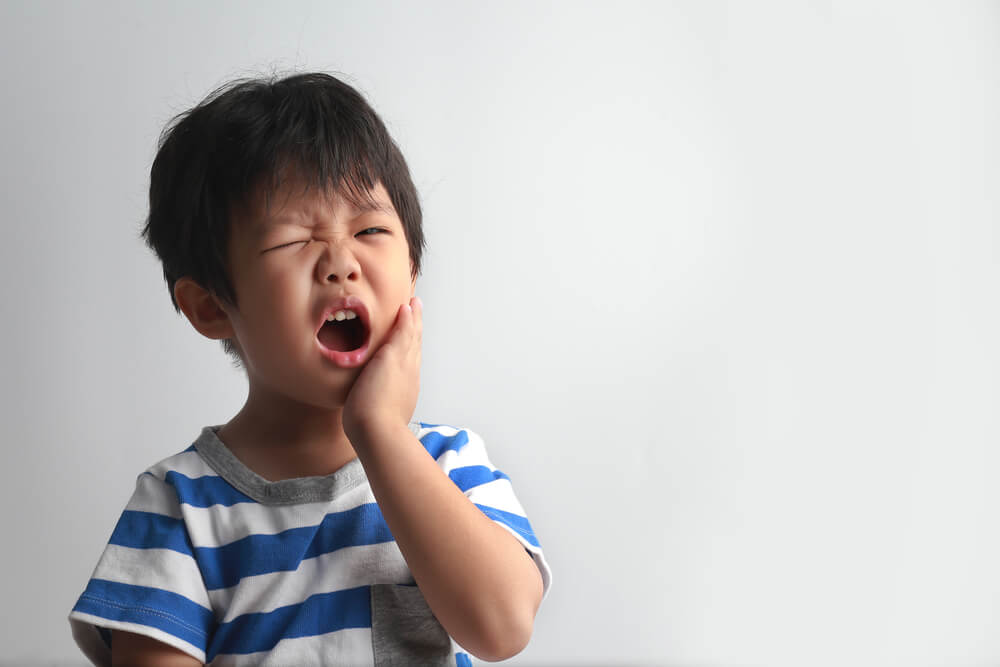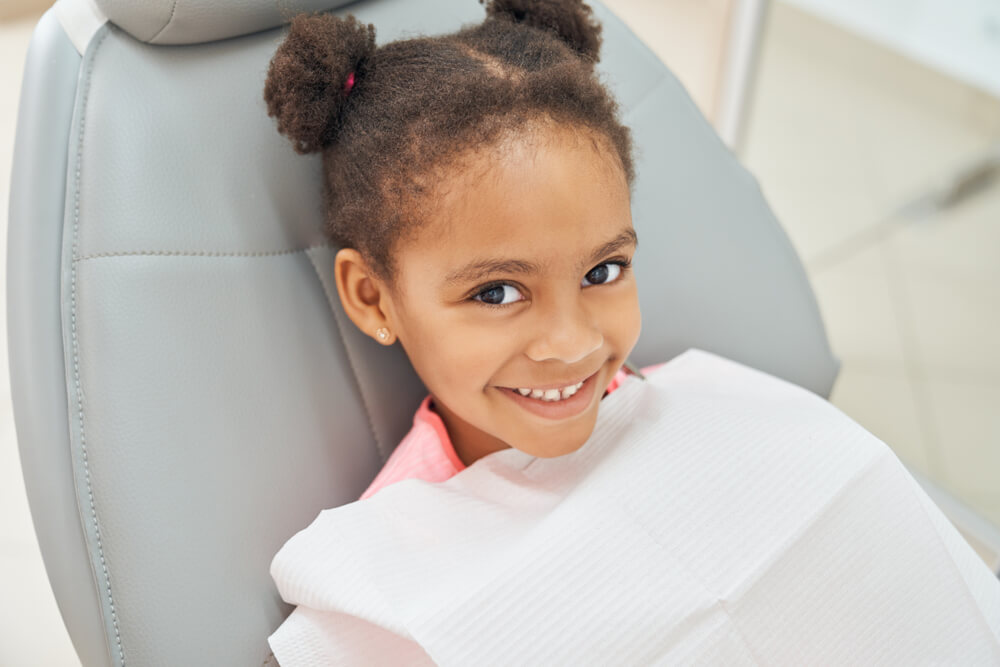
Table of Contents
What Could be Causing My Child’s Tooth Pain?
During childhood, your little one’s baby teeth come in, fall out and are eventually replaced with permanent teeth. With so many changes going on in their mouth, discomfort can happen. And while, yes, teething or a loose tooth can cause pain in a child, if a toothache is persistent or severe, it might be a sign of something more serious that needs to be treated.
To help give you a better idea of what’s normal, what’s not and how to find relief, our Brooklyn kids’ dentists will cover:
What to Look for if Your Child Has Tooth Pain
If your child has tooth pain, the first step is determining whether or not it’s a dental emergency. Older kids can probably tell you which tooth is hurting, how long it’s been hurting and whether it’s persistent throbbing pain or it comes and goes. Babies and toddlers can’t communicate all of this yet but might be able to show you the general location of their pain.
If your child has facial swelling or a fever, this is a sign of an infection, so call your pediatric dentist right away. Also be sure to ask your kiddo if they’ve been injured recently and look for signs of trauma like broken, chipped or loose teeth and cuts or scrapes on the lips or tongue.
If you think your child has a broken or dislocated jaw or a concussion, seek medical attention immediately. If a tooth has fallen out, is loose or fractured, call the dentist, because it can often be saved within an hour or two after the injury.
If your child’s toothache isn’t the result of an infection or trauma, it’s probably not a dental emergency, though you will likely still need to schedule a dental visit to have it addressed. Look in their mouth for obvious decay, tooth discoloration, stuck food particles, red, swollen gums or any other changes that could give you clues as to what’s causing your child’s tooth pain.
The Common Causes of Tooth Pain in Children
While not every instance of tooth pain will fall into one of the following categories, these are the causes we see most frequently as a children’s dentist in Brooklyn:
- Tooth Decay – Early stage tooth decay in children typically doesn’t cause any pain at all. However, if not treated, a cavity will continue to get larger. Once it reaches the tooth’s pulp chamber, which contains nerves and blood vessels, kids may develop throbbing tooth pain that is bad enough to wake them up from sleep. Since this discomfort tends to get worse when kids are lying down, your child might complain of more severe tooth pain at night.
- Loose or Broken Fillings or Dental Crowns – Bacteria can penetrate underneath damaged or loose fillings and pediatric dental crowns, causing decay, inflammation and pain. Food can also get trapped, leading to pain while chewing.
- Trauma – Injury is a common cause of tooth pain in toddlers who are learning to walk and aren’t very steady on their feet yet. Older kids are more likely to experience a dental injury during sports or other physical activities if they’re not wearing a mouthguard.
- Losing Baby Teeth – Loose tooth pain in a child usually resolves as soon as the baby tooth falls out. Most of the time, losing baby teeth doesn’t hurt, however, occasionally, the permanent tooth can put pressure on the nerves or push against the gums as it gets ready to erupt.
- Teeth Grinding or Clenching – If your child has pain in multiple teeth and has a sore jaw in the morning, teeth grinding or clenching, technically called bruxism, might be the culprit. Grinding puts pressure on the teeth, jaw and temporomandibular joints (TMJ), causing pain. It can also wear down the enamel, leaving the underlying dentin exposed, which makes teeth sensitive.
- Chipped or Cracked Teeth – Kids with misaligned teeth or bruxism can develop hairline chips and cracks in their teeth. These can cause pain, as well as sensitivity when eating or drinking.
- Brushing Incorrectly – If children brush too aggressively, it may wear down the enamel, making teeth more sensitive. They might also cut or bruise their gums.
- Food and Drinks – Drinking or eating something super sweet or acidic or biting on something really hard can cause temporary tooth pain or increase existing sensitivity. If food gets lodged between the teeth or under the gum line, this too can hurt.
- Sinus Problems – Your child has sinuses that sit right above their top teeth. When the sinuses are inflamed or congested from a cold, allergies, sinus infection or other issue, the pressure can make the top teeth ache. Typically, multiple teeth will hurt and your child will also have a runny nose and nasal congestion. The tooth pain should go away as soon as the infection clears up.
- Dental Abscess – If your child has severe tooth pain and a small, pus-filled pimple on their gums, it could be a dental abscess. An abscess occurs due to a bacterial infection from untreated decay or an injury. Pain can be constant and throbbing or come and go and it may radiate to the jaw, neck or ear. Kids will also usually have a fever, bad breath, a bad taste in their mouth, shiny, swollen gums, and/or facial swelling.
A dental abscess is considered a dental emergency and should be treated as soon as possible. The infection can spread to the surrounding teeth, jawbone and even other parts of the body.

The Best Home Remedies for Tooth Pain in Kids
Unless a toothache is from something that doesn’t require dental treatment, such as sinus congestion or a loose baby tooth that’s ready to fall out, you should schedule a visit with your pediatric dentist for an exam.
In the meantime, we know you’re probably wondering how to help a child with tooth pain until you’re able to get in for a visit. Here are some tried and true home remedies that should make discomfort more manageable:
- Brush and Floss Their Teeth – Help your child gently floss both sides of their sore tooth and then brush their teeth. If discomfort is because of a stubborn bit of food, dislodging it will ease pain. Plus, even if food isn’t at the root of the problem, it’s still ideal to keep their mouth clean.
- Make a Saltwater Rinse – A saltwater rinse is a safe, natural remedy for tooth pain relief. Add one teaspoon of salt to eight ounces of warm water. Stir the mixture until the salt dissolves. Ask your child to swish with the saltwater rinse for about 30 seconds, holding it on the affected area, before spitting it out. Repeat the process until they finish the glass. They can use the rinse several times a day.
- Use a Cold Compress – Give your child an ice pack to hold on their jaw or cheek in the area where their tooth hurts. Not only will ice provide some numbing, it will also reduce any inflammation. You may want to wrap the ice pack in a clean dish towel. They can use the cold compress for a few minutes off and on throughout the day as needed.
- Give Them an Over-the-Counter Pain Reliever – If necessary, an over-the-counter pain reliever will help get rid of tooth pain. Give your child whatever you normally would give them for a headache. Follow the dosage instructions on the package or from your pediatrician.
- Dental Wax – Covering a loose or broken filling or dental crown with dental wax (the kind you’d use for a child’s braces) can help hold the restoration in place until you visit the dentist. It will also protect the exposed tooth to reduce sensitivity and discomfort. Just be sure your child is old enough to know not to swallow the wax. Simply break off a small piece of wax, roll it in between your fingers to warm it up and stick it on the damaged filling or crown.
The Home Remedies for Tooth Pain That Are NOT Safe for Kids
There are a few popular home remedies for tooth pain that should not be used for children. If your child has a toothache, avoid the following:
- Rubbing Aspirin on the Gums – Never rub aspirin or any other pain killer on a child’s sore tooth or gums. It can burn the soft tissues of their mouth and make pain worse.
- Oral Anesthetics With Benzocaine – Though billed as a way to stop tooth pain fast, over-the-counter, oral anesthetics, like Orajel, often contain benzocaine. The ingredient can cause a rare, but serious side effect in young children, particularly those ages two and under. So, skip the oral anesthetics for infants, toddlers and younger children. For older kids, you may want to ask your pediatrician or pediatric dentist first.
- Clove Oil – Clove oil is a natural tooth pain remedy that’s been gaining a lot of popularity. While it may be helpful for adults, unfortunately, it’s not a good option for tooth pain relief in the younger set. In children, clove oil has been linked to severe side effects.
Schedule a Visit With a Children’s Dentist in Brooklyn
If you’re in need of a children’s dentist in Brooklyn to get to the bottom of your child’s tooth pain, schedule a visit at Bitesize Pediatric Dentistry in Park Slope, DUMBO or Williamsburg today! Our pediatric dentists are experts in kids’ oral health and will be able to put your little one on the path to relief. The sooner issues like decay are addressed, the easier treatment will be.






